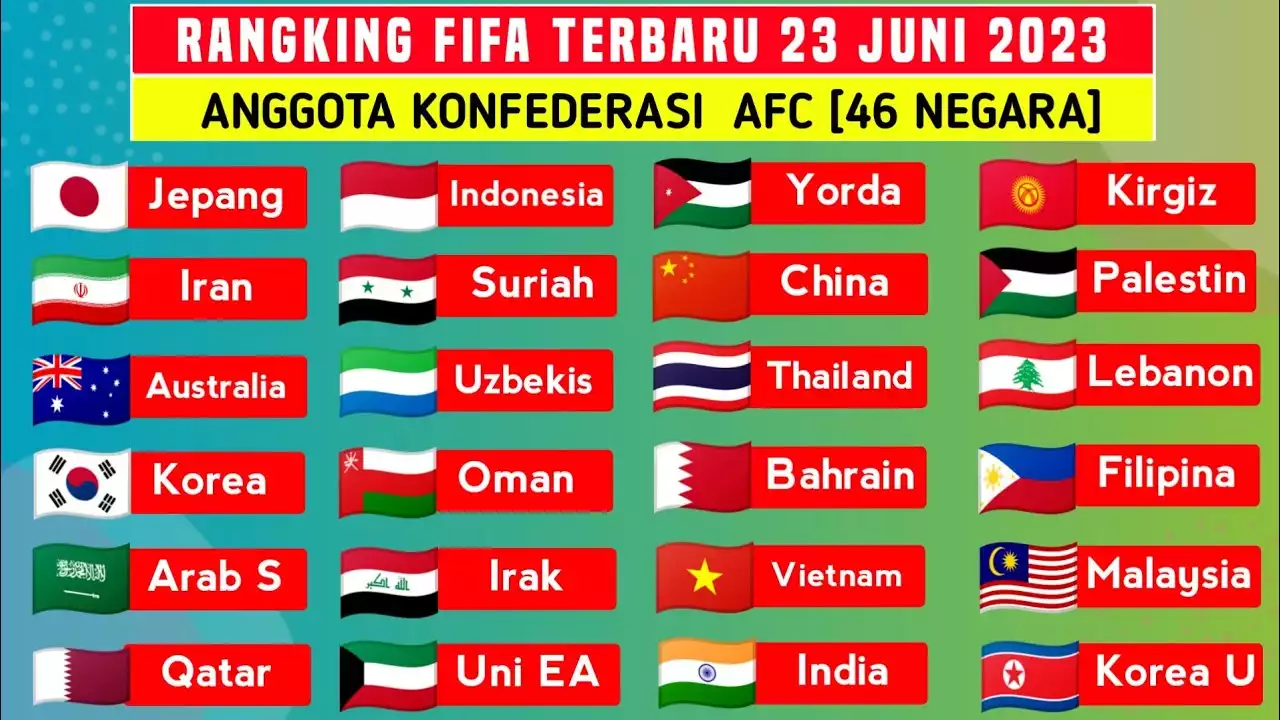Understanding the AFC qualification process
The qualification process for the Asian Cup is a rigorous one that involves multiple stages. Teams from the Asian Football Confederation (AFC) compete against each other to secure their spot in the tournament. The AFC has devised a comprehensive system that takes into account various factors, including FIFA rankings, to determine which teams qualify.
The process begins with the preliminary round, where lower-ranked teams battle it out for a chance to advance to the main qualification round. The main qualification round consists of multiple groups, with the top teams from each group earning their place in the Asian Cup. The number of teams that can qualify from each group depends on the FIFA rankings and the overall strength of the teams in that group.
The importance of FIFA rankings in AFC qualification
FIFA rankings play a crucial role in the AFC qualification process. These rankings, which are updated on a monthly basis, reflect the performance of national teams in international matches. The higher a team's FIFA ranking, the better their chances of securing a favorable draw and advancing to the Asian Cup.
FIFA rankings are calculated using a complex algorithm that takes into account factors such as match results, the importance of the match, and the strength of the opposing team. Teams that consistently perform well in international competitions and defeat higher-ranked opponents are rewarded with higher FIFA rankings. On the other hand, teams that underperform or lose against lower-ranked opponents may see their rankings drop.
How FIFA rankings affect the seeding of teams in the Asian Cup
FIFA rankings also play a significant role in determining the seeding of teams in the Asian Cup. Seeding refers to the process of assigning teams to different pots based on their rankings, which then determines their group stage opponents in the tournament. Higher-ranked teams are placed in separate pots, ensuring that they do not face each other in the early stages of the competition.
The seeding process aims to create a balance and ensure that the tournament is competitive. It prevents a scenario where all the strongest teams are placed in the same group, which would make the other groups significantly weaker. By distributing the top-ranked teams across different groups, the seeding process adds an element of fairness and increases the overall quality of the tournament.
Case studies: The impact of FIFA rankings on previous Asian Cup qualifiers
To understand the true impact of FIFA rankings on AFC qualification, let's take a look at some case studies from previous Asian Cup qualifiers. These examples showcase how teams' rankings influenced their qualification journey and shed light on the strategies they employed to improve their chances.
Case Study 1: Japan
Japan, a powerhouse in Asian football, consistently maintains a high FIFA ranking. Their strong performance in international matches and successful participation in previous Asian Cup tournaments have contributed to their high rankings. As a result, they often find themselves in favorable groups during qualification, increasing their chances of securing a spot in the tournament.
Case Study 2: United Arab Emirates (UAE)
The United Arab Emirates is another interesting case to examine. Despite having a strong football infrastructure and investing heavily in the sport, they have struggled to maintain a high FIFA ranking. This has resulted in tougher qualification routes, as they often find themselves in groups with higher-ranked teams. As a result, their qualification journey becomes more challenging, requiring them to perform exceptionally well against tough opponents.
Strategies for improving FIFA rankings in AFC qualification
For teams looking to improve their FIFA rankings and enhance their chances of qualifying for the Asian Cup, several strategies can be employed.
1. Scheduling strategic friendlies: Participating in international friendlies against higher-ranked teams can provide valuable opportunities to improve rankings. Victories or even competitive performances against strong opponents can significantly boost a team's ranking.
2. Emphasizing important matches: The importance of matches in the FIFA ranking algorithm means that performing well in significant competitions, such as the AFC Asian Cup itself or other regional tournaments, can have a significant impact on a team's ranking. Teams should focus their efforts on these crucial matches to maximize their chances of improving their rankings.
3. Consistency in performance: Consistently performing well in international matches is key to maintaining or improving FIFA rankings. Teams should strive to achieve positive results against both higher-ranked and lower-ranked opponents to demonstrate their ability to compete at a high level consistently.
Controversies and criticisms surrounding FIFA rankings in AFC qualification
While FIFA rankings are an integral part of the AFC qualification process, they are not without controversies and criticisms. Some argue that the algorithm used to calculate rankings is flawed, as it fails to accurately reflect the true strength of teams. Others believe that the rankings are too heavily influenced by the outcome of friendly matches, which may not always accurately represent a team's true capabilities.
Critics also point out that the ranking system may favor teams from certain regions, as the algorithm may not adequately account for the varying levels of competition in different parts of the world. This can create an imbalance in the qualification process, potentially disadvantaging teams from certain regions.
The role of FIFA in promoting fair play and competitiveness in the Asian Cup
While controversies may exist, FIFA plays a vital role in promoting fair play and competitiveness in the Asian Cup. By using rankings to determine qualification and seeding processes, FIFA ensures that the tournament features a diverse range of teams, representing the best of Asian football.
FIFA's involvement also brings global recognition and exposure to the Asian Cup, attracting international audiences and providing opportunities for Asian teams to showcase their talent on a larger stage. This exposure contributes to the growth and development of football in the region, creating a positive impact on the sport as a whole.
The future of FIFA rankings in AFC qualification
As football continues to evolve, so too will the FIFA rankings and their impact on AFC qualification. It is likely that FIFA will continue to refine the ranking algorithm to address the criticisms and ensure a fairer representation of teams' true capabilities.
Moreover, with the growing popularity of data analytics and advanced statistical models, we may see more sophisticated ranking systems being implemented in the future. These systems could provide a more accurate assessment of teams' strengths and further enhance the qualification process for the Asian Cup.
FIFA rankings play a significant role in the AFC qualification process for the Asian Cup. Teams must navigate through the complexities of ranking calculations to secure their spot in the tournament. Understanding the interplay between FIFA rankings and team performance is crucial for Asian teams aspiring to compete on the big stage. By analyzing historical trends and strategies employed by previous qualifiers, teams can enhance their chances of success. While controversies may exist, FIFA's involvement promotes fair play and competitiveness in the Asian Cup. The future of FIFA rankings in AFC qualification holds potential for further refinement and improvement, ensuring a more accurate representation of teams' capabilities. The journey to the Asian Cup is undoubtedly challenging, but unlocking its doors through FIFA rankings is an achievement that Asian teams strive for.










